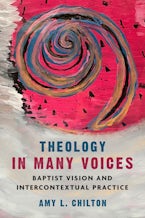Western evangelical and baptist theologies have largely avoided experience as a source of theology. By not seeing, or not utilizing, lived experience in its own theologies and rejecting it in "contextual" theologies, these traditions have failed to recognize the full presence of God as revealed in the world. Current theological dialogues arising from admittedly contextualized experiences, such as LGBTQI+, Black, or various women’s theologies struggle to find a place at the theological table, because they ring untrue to evangelical and baptist ears. What we are then left with is an idiosyncratic deity who mirrors the community in power.
Theology in Many Voices presents an understanding of theology as a practice of the church, one that both makes space for lived community experience in theological content and also provides the means necessary for encountering, engaging, and incorporating the theological insights of the global and historic church into Western theological discourse. Amy L. Chilton engages the contemporary use of Alasdair MacIntyre’s concept of "practice" in theological method, particularly through the writings of James Wm. McClendon Jr., to show how it can be used as a means of moving beyond the "Scripture vs. experience" divide while still retaining the norming role of Scripture and the essential nature of God’s revelation in context.
Two other figures illuminate Chilton’s vision of experience-oriented theology, giving fuller voice to the church’s witness of faith and practice: the Roman Catholic Jon Sobrino, whose work with the Salvadoran poor influenced his Christology through his "Christo-praxic" method, and Muriel Lester, whose communal living practices influenced her theology of peace and ability to move across religious boundaries and showed how to do theology as practice intercontextually. Finally, whereas the methodological use of practice has found few inroads to Christian doctrine, Chilton explores the doctrines of the Trinity and theological anthropology in light of the practiced contributions of the church global, especially women and the marginalized.

